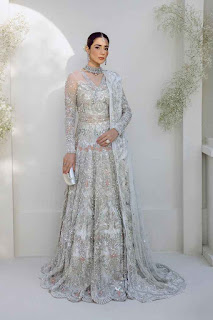Sustainability in Nikkah Fashion: Eco-Friendly Choices
The world of fashion is witnessing a transformation as sustainability takes center stage, influencing consumer choices and industry practices. In the realm of Nikkah fashion, where pakistani wedding dresses uk hold a significant place, a growing awareness of environmental impact is inspiring brides and designers alike to make eco-friendly choices. This article explores the intersection of sustainability and Nikkah fashion, emphasizing the importance of adopting eco-conscious practices in the creation and selection of Pakistani bridal dresses in the UK.
Rising Consciousness in Nikkah Fashion:
As global awareness of environmental issues grows, individuals are increasingly seeking sustainable alternatives in various aspects of their lives, including fashion choices. The significance of weddings, particularly Nikkah ceremonies, amplifies the impact of these choices, prompting a shift towards eco-friendly practices in the creation and selection of Pakistani wedding dresses in the UK.
Cultural Reverence for Nature: The ethos of sustainability aligns with cultural values that emphasize respect for nature. Many couples view their Nikkah ceremony as an opportunity to celebrate love while also honoring the environment through mindful choices in attire.
Influence of Global Trends: The global fashion industry's movement towards sustainability has a direct impact on Nikkah fashion trends. Brides and designers are increasingly influenced by eco-conscious practices, seeking ways to incorporate sustainability without compromising on the cultural richness of Pakistani bridal dresses.
Eco-Friendly Choices in Pakistani Bridal Dresses:
Sustainable practices in Nikkah fashion extend beyond the materials used in dresses. They encompass the entire lifecycle of the garment, from design and production to consumption and disposal. Several eco-friendly choices are gaining prominence in the creation of pakistani bridal dresses uk.
Ethical Fabric Selection: Designers are opting for sustainable and ethically sourced fabrics for Pakistani wedding dresses. Choices include organic cotton, bamboo silk, and Tencel, which have lower environmental impacts compared to traditional fabrics. These materials not only prioritize sustainability but also offer comfort and luxurious textures.
Vintage and Upcycled Attire: Brides are exploring the charm of vintage and upcycled Pakistani bridal dresses. By repurposing existing garments or choosing vintage pieces, they contribute to a circular fashion economy, minimizing the demand for new resources and reducing waste.
Local Artisan Collaborations: Collaborations with local artisans contribute to sustainable fashion practices. By supporting traditional craftsmanship and local production, designers infuse cultural authenticity into Pakistani bridal dresses while minimizing the carbon footprint associated with international shipping.
Minimalistic and Timeless Designs: Sustainable Nikkah fashion is characterized by minimalistic and timeless designs that stand the test of time. Brides are increasingly choosing dresses with classic silhouettes and versatile styles that can be repurposed for other occasions, promoting a more sustainable approach to wardrobe management.
Natural Dyes and Eco-Friendly Embellishments: Designers are exploring natural dyes made from plant extracts and eco-friendly embellishments. These choices not only reduce the environmental impact of production but also add unique, handcrafted elements to Pakistani wedding dresses, enhancing their individuality.
Customization and Longevity:
Sustainable Nikkah fashion encourages a shift towards customization and the creation of timeless pieces that can be cherished beyond the wedding day. Customized Pakistani bridal dresses, tailored to individual preferences and body types, promote a sense of connection and longevity.
Made-to-Order Practices: Adopting made-to-order practices reduces excess inventory and minimizes the environmental impact of overproduction. This approach ensures that each Pakistani wedding dress is created with intention and purpose, aligning with the bride's vision.
Versatile Outfits: Designers are creating versatile Pakistani bridal dresses that can be repurposed for other events or altered for post-wedding wear. This approach maximizes the utility of the dress, encouraging brides to invest in pieces that hold sentimental value beyond the wedding day.
Quality Craftsmanship: Prioritizing quality craftsmanship enhances the longevity of Pakistani bridal dresses. Well-made garments are more likely to withstand the test of time, allowing brides to pass down their wedding attire as cherished heirlooms.
Educating Brides and Designers:
Embracing sustainability in Nikkah fashion requires education and awareness among both brides and designers. Initiatives to inform and inspire individuals to make eco-friendly choices can drive positive change in the industry.
Workshops and Seminars: Hosting workshops and seminars on sustainable fashion practices can educate designers about eco-friendly materials, ethical production methods, and the environmental impact of different choices. Similarly, brides can gain insights into making conscious decisions for their Nikkah attire.
Collaborations with Sustainable Brands: Designers can collaborate with sustainable brands to incorporate eco-friendly elements into their collections. Partnering with brands that align with ethical and environmental values enables the integration of sustainable practices into Pakistani wedding dresses.
Online Resources and Guides: Creating online resources and guides on sustainable Nikkah fashion can empower brides to make informed choices. These resources can cover topics such as eco-friendly fabrics, ethical production, and tips for maintaining and repurposing wedding attire.
Conclusion: Bridging Tradition and Sustainability:
Sustainability in Nikkah fashion represents a harmonious fusion of tradition and modern consciousness. Brides can celebrate their cultural heritage through pakistani wedding clothes uk while contributing to a more sustainable and ethical fashion industry.
By embracing eco-friendly choices, from fabric selection to production methods and beyond, Nikkah fashion can become a driving force for positive change. As brides, designers, and the industry as a whole prioritize sustainability, the future of Nikkah fashion unfolds as a testament to the beauty of tradition intertwined with a deep commitment to environmental stewardship.



Comments
Post a Comment